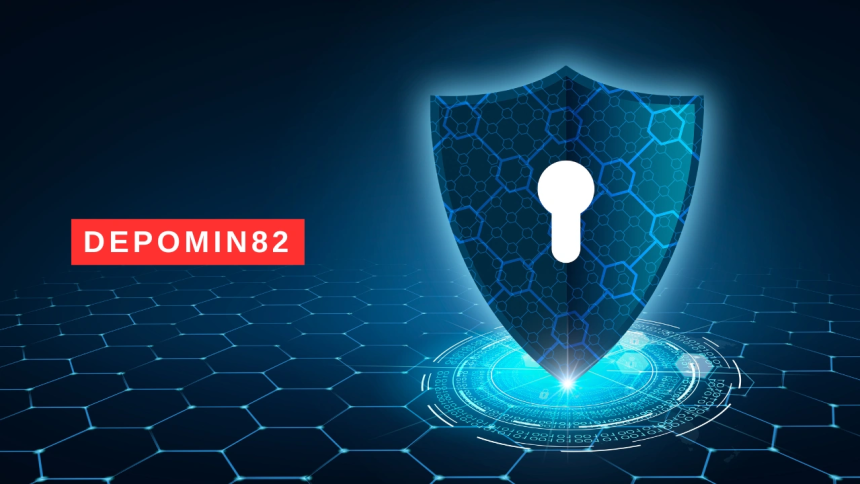In an increasingly interconnected world, cybersecurity is more critical than ever. With cyber threats evolving at an alarming rate, traditional security measures often fall short in protecting sensitive information and ensuring digital safety. Amid these challenges, a new cybersecurity protocol has emerged—Depomin82. This innovative protocol is designed to address vulnerabilities in current systems, offering a more resilient and adaptive approach to online security. In this article, we will explore the concept of Depomin82, its potential applications, and how it could shape the future of cybersecurity.
What is Depomin82?
Depomin82 is an advanced cybersecurity protocol introduced as a response to the growing complexity and sophistication of cyberattacks. The name “Depomin82” is derived from a combination of several technological and cryptographic elements that work in tandem to ensure the highest level of security for users and organizations. The protocol was designed to counter the challenges posed by conventional methods such as firewalls, antivirus software, and encryption techniques that are becoming outdated in the face of modern cyber threats.

The core idea behind Depomin82 is to combine machine learning, blockchain technology, and quantum encryption to create a decentralized security system capable of adapting in real time to new and emerging threats. It is a next-generation protocol that aims to replace traditional security measures, offering a more dynamic and robust defense against cybercrime.
The Evolution of Cybersecurity Threats
To understand the importance of Depomin82, it’s essential to review the evolution of cybersecurity threats over the years. As technology advances, so do the tactics used by hackers and malicious actors. Early cybersecurity threats were relatively simple, consisting of viruses and malware that targeted individual devices. Over time, however, these threats have become more complex, involving sophisticated ransomware attacks, data breaches, and even nation-state-sponsored cyber warfare.
Some of the most significant cybersecurity threats that have emerged in recent years include:
- Ransomware Attacks: These attacks involve malicious software that encrypts a victim’s data and demands payment (usually in cryptocurrency) to unlock it. Notable ransomware attacks such as WannaCry and NotPetya have caused widespread damage to businesses and governments.
- Data Breaches: High-profile breaches like the Equifax data breach exposed millions of individuals’ personal information, including social security numbers, addresses, and other sensitive data.
- Phishing Attacks: Phishing remains one of the most common forms of cyberattack, where attackers deceive individuals into providing confidential information through fake emails, websites, or phone calls.
- Advanced Persistent Threats (APT): APTs are prolonged cyberattacks that aim to steal sensitive data over an extended period, often going undetected. Nation-states and large organizations are often the primary targets.
- IoT Vulnerabilities: With the proliferation of connected devices, the Internet of Things (IoT) has become a significant target for cybercriminals. Many IoT devices lack robust security measures, making them an easy target for exploitation.
As these threats evolve, traditional cybersecurity measures are struggling to keep up. This is where Depomin82 comes into play. By integrating cutting-edge technologies and protocols, it offers a more adaptable and forward-thinking solution to contemporary cybersecurity challenges.
Key Features of Depomin82

Depomin82 is designed to address the limitations of current security frameworks. Here are the key features that set it apart:
1. Machine Learning and AI-Driven Detection
One of the standout features of Depomin82 is its integration of machine learning (ML) and artificial intelligence (AI). Traditional cybersecurity protocols rely on predefined rules and signatures to detect threats. However, this approach can be bypassed by advanced attacks that don’t match known patterns.
Depomin82, on the other hand, uses AI and ML to analyze network traffic, user behavior, and system anomalies in real time. This allows the protocol to detect and respond to novel threats that might otherwise go unnoticed. By continuously learning from new data and incidents, Depomin82 evolves and adapts, becoming more effective at identifying and neutralizing emerging cyber threats.
2. Quantum Encryption
As quantum computing continues to advance, traditional encryption methods, such as RSA and AES, are at risk of becoming obsolete. Quantum computers are capable of breaking current encryption standards by rapidly factoring large numbers, a process that is computationally impossible for classical computers.
To counter this threat, Depomin82 incorporates quantum encryption algorithms. These algorithms are designed to be resistant to the power of quantum computing, ensuring that sensitive data remains secure even in the face of future technological advancements. By using quantum-safe encryption, Depomin82 provides a long-term solution to the growing concerns around quantum threats.
3. Blockchain Integration for Decentralized Security
Depomin82 leverages blockchain technology to create a decentralized security framework. In a traditional centralized system, a single point of failure—such as a compromised server or data breach—can undermine the entire security structure. Depomin82, however, uses a distributed ledger system to store and authenticate data across multiple nodes in the network.
This decentralized approach makes it far more difficult for attackers to gain control of the system or manipulate data. Each transaction or data exchange is verified by multiple participants, ensuring that the information remains authentic and tamper-proof. This enhances the overall integrity of the system, offering a higher level of trust and security compared to centralized models.
4. Self-Healing Systems
One of the most innovative aspects of Depomin82 is its ability to enable self-healing systems. When a security breach is detected, the protocol can automatically respond by isolating the affected system or network segment, while simultaneously initiating countermeasures such as data recovery, system patching, and threat neutralization.
By automating the process of detecting and responding to attacks, Depomin82 minimizes the damage caused by cyber threats and reduces the time required to recover from an incident. This self-healing capability ensures that organizations can continue operating with minimal disruption even in the event of a cyberattack.
5. Adaptive Threat Intelligence Sharing
Depomin82 supports adaptive threat intelligence sharing across organizations and industries. In today’s cybersecurity landscape, collaboration is key to staying ahead of evolving threats. The protocol allows organizations to share real-time information about emerging threats, attack vectors, and vulnerabilities with trusted partners.
By creating a shared pool of intelligence, Depomin82 enhances the ability of organizations to proactively defend against cyberattacks. This collaborative approach not only improves the overall security posture of individual organizations but also strengthens the collective defense of entire sectors or industries.
Potential Applications of Depomin82

The versatility of Depomin82 makes it applicable across a wide range of industries and use cases. Below are some areas where the protocol could have a transformative impact:
1. Government and Critical Infrastructure
National governments and critical infrastructure sectors, such as energy, transportation, and healthcare, are prime targets for cyberattacks. Depomin82’s robust and adaptive security measures can protect these sectors from both cybercrime and nation-state-sponsored attacks. Its quantum-safe encryption and decentralized framework make it an ideal solution for safeguarding sensitive government data and critical systems.
2. Financial Institutions
The financial sector is one of the most vulnerable to cyberattacks, with large-scale breaches leading to significant financial losses and reputational damage. Depomin82’s combination of machine learning, AI, and blockchain technology provides financial institutions with a powerful defense against fraud, data breaches, and ransomware attacks.
3. Healthcare
Healthcare organizations hold vast amounts of personal and medical data, making them an attractive target for cybercriminals. Depomin82’s self-healing systems and quantum encryption ensure that patient data remains secure and protected, even in the face of sophisticated cyberattacks. Additionally, its decentralized architecture helps mitigate the risks associated with centralized databases.
4. Internet of Things (IoT)
With the exponential growth of IoT devices, securing the IoT ecosystem has become a major challenge. Depomin82’s adaptive security protocols and blockchain integration make it an effective solution for securing IoT networks, preventing unauthorized access, and ensuring the integrity of data transmitted between devices.
5. Cloud Computing
As more organizations move their operations to the cloud, ensuring the security of cloud environments becomes paramount. Depomin82 can be integrated with cloud platforms to provide advanced threat detection, data encryption, and secure access controls, ensuring that sensitive information is protected from cloud-specific threats.
Challenges and Limitations
While Depomin82 represents a significant advancement in cybersecurity, there are still challenges and limitations to consider:
- Adoption and Integration: The widespread adoption of Depomin82 would require significant changes to existing cybersecurity infrastructure. Organizations would need to invest in new hardware, software, and training to fully implement the protocol, which could be costly and time-consuming.
- Scalability: While Depomin82’s decentralized approach offers many advantages, scaling it to accommodate global networks could pose challenges in terms of performance and latency.
- Regulatory Compliance: As Depomin82 incorporates blockchain and quantum encryption, it may face regulatory challenges in industries with strict data protection laws and standards.
- Cost: The implementation of advanced technologies like quantum encryption and machine learning can be expensive. Small to medium-sized enterprises may find it difficult to adopt Depomin82 without significant investment.
Conclusion
Depomin82 is a revolutionary step forward in the realm of cybersecurity. By combining machine learning, blockchain, quantum encryption, and decentralized security, it offers a comprehensive solution to the evolving landscape of cyber threats. While there are challenges to its adoption, the potential benefits—such as enhanced protection against cyberattacks, self-healing systems, and more resilient infrastructures—make Depomin82 a promising contender in the future of cybersecurity protocols.
As cyber threats continue to grow in sophistication, innovations like Depomin82 will play a critical role in ensuring the security and privacy of individuals, organizations, and nations alike. The future of cybersecurity is likely to be shaped by such advanced protocols, which will not only enhance protection but also enable a more secure and trustworthy digital environment.







